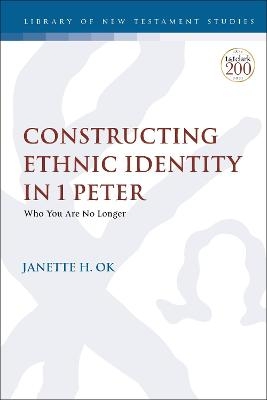
Constructing Ethnic Identity in 1 Peter
Who You Are No Longer
Seiten
2022
T.& T.Clark Ltd (Verlag)
978-0-567-69854-4 (ISBN)
T.& T.Clark Ltd (Verlag)
978-0-567-69854-4 (ISBN)
Janette H. Ok argues that 1 Peter characterizes Christian identity as an ethnic identity, as it holds the potential to engender a powerful sense of solidarity for readers who are experiencing social alienation as a result of their conversion. The epistle describes and delineates a communal identity based on Jewish traditions, and in response to the hostility its largely Gentile Anatolian addressees are experiencing as religious minorities in the Roman empire. In order to help construct a collective understanding of what it means to be a Christian in contrast to non-Christians, Ok argues that the author of the epistle employs “ethnic reasoning” or logic.
Consequently, the writer of 1 Peter makes use of various literary and rhetorical strategies, including establishing a sense of shared history and ancestry, delineating boundaries, stereotyping and negatively characterizing “the other,” emphasizing distinct conduct or a common culture, and applying ethnic categories to his addressees. Ok further highlights how these strategies bear striking resemblances to what modern anthropologists and sociologists describe as the characteristics of ethnic groups. In depicting Christian identity as an ethnic identity akin to the unique religious-ethnic identity of the Jews, Ok concludes that 1 Peter seeks to foster internal cohesion among the community of believers who are struggling to forge a distinctive and durable group identity, resist external pressures to revert to a way of life unbefitting the people of God, and live as those born anew to a living hope.
Consequently, the writer of 1 Peter makes use of various literary and rhetorical strategies, including establishing a sense of shared history and ancestry, delineating boundaries, stereotyping and negatively characterizing “the other,” emphasizing distinct conduct or a common culture, and applying ethnic categories to his addressees. Ok further highlights how these strategies bear striking resemblances to what modern anthropologists and sociologists describe as the characteristics of ethnic groups. In depicting Christian identity as an ethnic identity akin to the unique religious-ethnic identity of the Jews, Ok concludes that 1 Peter seeks to foster internal cohesion among the community of believers who are struggling to forge a distinctive and durable group identity, resist external pressures to revert to a way of life unbefitting the people of God, and live as those born anew to a living hope.
Janette H. Ok is associate professor of New Testament at Fuller Theological Seminary, USA.
Preface
Acknowledgments
Abbreviations
Chapter 1: Introduction: What Do Ethnicity and Identity Have to Do with 1 Peter?
Chapter 2: Defining and Defying Ethnicity in the Ancient World
Chapter 3: Common Blood: Establishing a New Patrilineage through the Blood of Christ
Chapter 4: Constructing Boundaries and Contesting Stigma in the Making of Ethnic Identity in 1 Peter
Chapter 5: Conclusion: Reinforcing Christian Distinctiveness through Bonds of Blood
Bibliography
| Erscheinungsdatum | 06.10.2022 |
|---|---|
| Reihe/Serie | The Library of New Testament Studies |
| Verlagsort | Edinburgh |
| Sprache | englisch |
| Maße | 156 x 234 mm |
| Themenwelt | Religion / Theologie ► Christentum ► Kirchengeschichte |
| ISBN-10 | 0-567-69854-8 / 0567698548 |
| ISBN-13 | 978-0-567-69854-4 / 9780567698544 |
| Zustand | Neuware |
| Haben Sie eine Frage zum Produkt? |
Mehr entdecken
aus dem Bereich
aus dem Bereich
von Athanasius bis Gregor dem Großen
Buch | Softcover (2024)
C.H.Beck (Verlag)
12,00 €
eine Geschichte der christlichen Kunst
Buch | Hardcover (2024)
C.H.Beck (Verlag)
32,00 €


